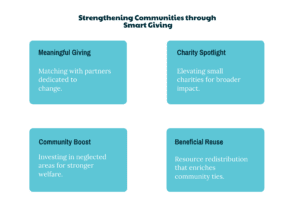Imagine a community where every child has access to quality education, every family has enough food, and every individual has the opportunity to thrive. This isn’t a distant dream, it’s a reality being shaped today by the strategic efforts of corporate philanthropy. In 2023, we’re witnessing a remarkable transformation in the way companies contribute to society, with corporate donation becoming more than just a tax-saving afterthought. It’s about making a real impact.
Companies are now embedding social responsibility into their core business strategies, recognizing that a strong community equates to a strong business.
Table of Contents
The Corporate Giving Landscape
In 2023, corporate social responsibility (CSR) is not just about donations, it’s about integrating ethical practices into the very fabric of business operations.
Companies are now prioritizing sustainable practices and eco-friendly initiatives to lower their carbon footprint. Waste reduction plans, shifts to renewable energy sources, and embracing circular economy principles are at the forefront of CSR strategies.
This holistic approach to CSR is transforming businesses into community stewards, ensuring that their operations contribute positively to the environment and society.
The Rise of Corporate Social Responsibility (CSR)
In the past year, we’ve seen a significant uptick in CSR initiatives, with companies becoming increasingly aware of their societal footprint.
According to recent data, corporate giving has not just increased in volume but also in thoughtfulness and strategic alignment with broader corporate goals.
Businesses are not only asking, “How much should we give?” but “How should our giving reflect our values and mission?”
This shift is evident in the surge of programs aimed at matching employee donations, volunteering time off, and in-kind contributions that leverage a company’s unique assets.
Understanding the ‘Why’ Behind Corporate Donations
The motivations behind corporate donations are evolving. It’s no longer just about the optics, it’s about genuine engagement with community needs.
Companies are looking to create lasting relationships with the communities they serve, going beyond one-off donations to establish ongoing partnerships.
This approach is driven by a deeper understanding of the interconnectedness of societal well-being and business success.
Companies are now actively seeking out causes that resonate with their brand and values, ensuring that their contributions have a lasting and meaningful impact.
The Mechanics of Impactful Donations
The current year has seen a rise in the strategic use of technology to enhance the impact of corporate donations.
Digital platforms are now being leveraged to connect donors with recipients more efficiently, ensuring that help reaches where it’s needed most, swiftly and effectively.
Additionally, companies are adopting blockchain technology for greater transparency in the donation process, allowing both donors and recipients to track the movement of goods and funds in real time, ensuring accountability and trust in corporate giving programs.
From Cash to Kind – The Spectrum of Corporate Donations
Cash donations are just the tip of the iceberg. Today’s corporate donors are diversifying their contributions, offering services, products, and expertise to drive change.
For instance, tech companies are providing cutting-edge software to nonprofits to amplify their impact.
These in-kind donations allow organizations to benefit from resources they might not otherwise afford, thereby enhancing their operational efficiency and expanding their reach.
Measuring the Impact – Beyond the Bottom Line
Measuring the true impact of donations can be challenging, but it’s essential. Companies are now using sophisticated metrics to understand how their contributions are making a difference, ensuring that every dollar counts towards creating a better world.
This often involves tracking the progress of initiatives funded by donations and assessing the direct outcomes of their contributions.
For example, a company donating to a literacy program may measure its impact by the increase in literacy rates in the targeted community.
Happen Ventures – A Case Study in Strategic Giving
Happen Ventures is at the cutting edge of CSR, embodying the 2023 trend of digital inclusion. By utilizing digital tools, they are ensuring that donations are not only beneficial to the community but also inclusive, reaching a wider demographic.
Their approach aligns with the latest CSR trends, which emphasize the importance of workplace diversity management and inclusive practices, ensuring that corporate giving programs are as diverse and equitable as the communities they aim to serve.
The Happen Ventures Model
Happen Ventures stands out with its innovative approach to corporate giving. By transforming waste into donations, they’re not just supporting communities but also promoting environmental sustainability.
This model is a win-win, offering companies a way to contribute meaningfully while also addressing their excess inventory challenges.
Happen Ventures acts as the bridge between corporations with surplus goods and communities in need, ensuring that products are repurposed in a way that maximizes social benefit.
Partnering for a Purpose
Happen Ventures carefully selects its partners, ensuring that both companies and nonprofits align with its vision of impactful giving. They’ve supported numerous small charities, making a significant difference in communities often overlooked by larger philanthropic efforts.
By focusing on these partnerships, Happen Ventures not only aids in resource distribution but also fosters a network of support that strengthens the fabric of community welfare. They have named their approach as beneficial reuse.
The Tax-Smart Approach to Donations
The conversation around corporate donations in 2023 includes a focus on CSR reporting solutions. Companies are now using advanced software to accurately report and track their corporate donation for tax purposes.
This not only simplifies the process of claiming tax benefits but also aligns with the growing demand for transparency in corporate philanthropy.
By providing clear and concise reports, companies can demonstrate their commitment to social responsibility while also ensuring compliance with tax regulations.
Fair Market Value – The What and Why
Understanding the fair market value (FMV) of donated goods is crucial for companies to recognize the potential tax benefits without navigating complex tax advice. It’s about being informed and prepared.
FMV is the price that property would sell for on the open market, and it’s important for companies to accurately assess this value to ensure they are receiving the appropriate tax deductions and not overvaluing their donations.
Calculating Benefits Without the Complexity
While we won’t delve into tax advice, it’s important for companies to grasp the basics of calculating potential tax benefits.
By understanding the rules of FMV, companies can make informed decisions about their donations.
Maintaining detailed donation records, getting appraisals for valuable items, and understanding tax rules are key for these businesses.
The Human Side of Corporate Philanthropy
This year, the narrative around corporate philanthropy is shifting towards the human stories behind the donations. Companies are increasingly aware of the power of storytelling in CSR and are using it to highlight the human impact of their contributions.
Sharing transformative donation stories helps businesses build a personal, empathetic image, appealing to employees and consumers.
Stories That Stick – The Power of Narrative in Corporate Donation
The most compelling aspect of corporate giving is the stories that emerge. These narratives not only inspire other companies to give back but also highlight the tangible benefits of strategic corporate donation.
Companies donating computers to schools highlight student successes in tech due to these tools.
Building a Legacy of Giving
Corporate philanthropy isn’t just about the present, it’s about building a legacy. Firms integrating giving into their ethos are crafting their legacy and leading a new wave of corporate philanthropy.
Transparent, accountable practices foster consumer and employee trust, creating enduring impacts.
Conclusion: The Future of Corporate Philanthropy
Corporate giving is shifting to strategic, value-aligned efforts for greater societal benefits. If you’re ready to be part of this transformative movement, Happen Ventures is your partner in strategic giving. By uniting corporate success with social good, we can revolutionize corporate philanthropy.






